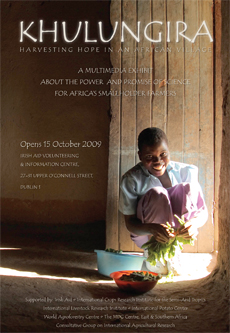Ireland’s Minister of State for Overseas Development, Mr. Peter Power, T.D., has launched an exhibition highlighting the potential of science for Africa’s smallholder farmers at the Irish Aid Volunteering and Information Centre in Dublin.
Ireland’s Minister of State for Overseas Development, Mr. Peter Power, T.D., has launched an exhibition highlighting the potential of science for Africa’s smallholder farmers at the Irish Aid Volunteering and Information Centre in Dublin.
The multimedia exhibition features videos, posters, photographs and soundscapes that introduce visitors to the people of Khulungira, a village in Malawi that has benefited from advances in agricultural research.
www.cgiarkhulungiraexhibit.org
“At present, one in six people worldwide go to bed hungry each night and many more cannot afford a healthy diet,” Mr. Power said. “If we do not do all in our power to reverse the rise in food insecurity and hunger, we will be failing in our basic human obligations, and accepting a scandalous situation which we have the capacity to change.”
The exhibition presents the people behind the grim statistics. The villagers of Khulungira are typical of millions of Africans who depend on smallholder farming for food and income. The challenges they face are daunting: If the rains are late, or crops are infested with a pest or disease, people can starve. If conditions are good, they may have a little extra to sell for income, enabling them to send their children to school. In this sort of scenario, even the smallest improvement in productivity can make a huge difference.
Thanks in part to research undertaken by the members of the Consultative Group on International Agricultural Research (CGIAR), farmers in Khulungira and other villages across Malawi have begun to plant new varieties of potatoes, sweet potatoes, groundnuts and trees. Others are improving the composition of soil and expanding their livestock holdings.
In each case, the change has increased production, improved diets and reduced vulnerability to catastrophic loses.
The CGIAR, established in 1971, is a strategic partnership of countries, international and regional organizations and private foundations dedicated to mobilizing agricultural science to reduce poverty, promote agricultural growth and protect the environment. The CGIAR supports an alliance of 15 international agricultural research centres.
The exhibition in Dublin features the work of four CGIAR centers: the World Agroforestry Centre (ICRAF), International Livestock Research Institute (ILRI), International Potato Center (CIP), and International Crops Research Institute for the Semi-Arid Tropics (ICRISAT). The creative development of the joint venture was led by ILRI at the request of Irish Aid . Support was also provided by the MDG Centre, East & Southern Africa and Irish Aid, the Government of Ireland’s programme for overseas development.
In 2009, Irish Aid has provided funding of almost €7 million to the CGIAR. “Continued investment in agricultural research is essential to success in transforming African agriculture into a highly-productive, sustainable system that can assure food security, keep children in school and lift millions out of poverty,” Minister Power said.
The exhibition is free and open to the public at the Irish Aid Volunteering and Information Centre, 27-31 Upper O’Connell St, Dublin 1 (corner of Cathal Brugha Street). It is scheduled to run through the end of 2009.



